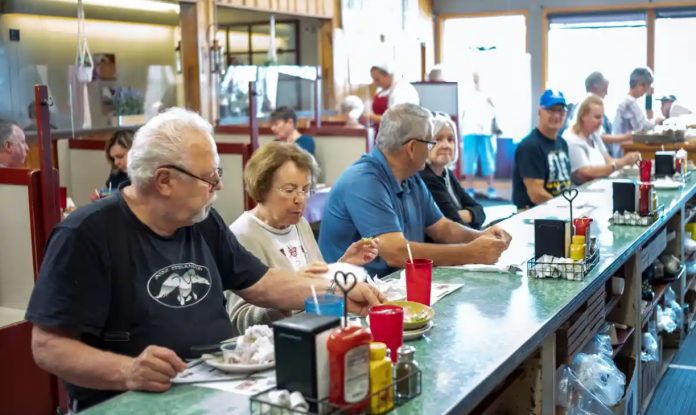
There are many ways to tackle rising costs and a slowing economy – but automatic gratuity is not one of them.
A restaurant in Hyde Park, Ohio, called Dutch’s has this on its bills: “We offer living wages to our employees partially funded by a 20% automatic gratuity.”
The reason behind this? Profitability, of course.
“Restaurants are behind the eight-ball, and we are taking a lot of the costs on and are trying to figure out kind of again reactively,” the owner of Dutch’s told a local news station.
I get it. It’s not easy to run a restaurant nowadays, what with lingering supply chain issues, rising costs, labor shortages and a slowing economy. But adding an automatic gratuity to a customer’s bill is not a great way to address these issues. Why?
For starters, it’s deceptive. Getting an unexpected charge (and yes, it’s unexpected, because regardless of how many signs you hang on the wall notifying your customers, people aren’t used to this practice and don’t pay attention) is off-putting. Customers see it, and feel like they’re being duped into paying for something they didn’t agree to. I’m betting the owner at Dutch’s hears this once in a while.
It’s also counter-cultural. You can pontificate as many times as you want that tipping isn’t done in Europe or Australia (the owner of Dutch’s of course pointed this out) but this is not Europe or Australia. This is the US, and it’s a tipping culture. Will that change? No one knows. Many restaurants – even well-known restaurants – have tried tinkering with tipping policies in the past and failed. For now, American restaurant customers expect to leave tips. That’s not going to change anytime soon.
Not only are customers in the US expecting to tip, many of us feel like it’s our opportunity to show our gratitude, our largesse, or even our disappointment in the services we received. It gives us a perceived control over the buying process. By taking that away, you’re taking away our freedom to do this. It’s as if you’re saying: we’re not capable of judging the value of a service and you’ll do it for me.
It’s also counter-motivational. My daughter and many of her friends worked as servers in various restaurants throughout college. And trust me on this: they were all about the tips. The prospect of a busy night got them out the door and into work on time. Taking this away takes away their motivation to do this, and as a consequence will ultimately hurt the restaurant.
It’s potentially short-changing. By forcing a tip on a customer you’re risking that the customer doesn’t tip any more than what’s on the bill. I almost always tip 20%, but sometimes I’ll tip even more if the service is really good. If I get a bill with 20% added on I feel less motivated to add even more. There’s more math involved, and it throws me off my game a bit. I have to make more of an effort. These factors may disincentivize a customer to tip more than what’s on the bill, even if they originally intended to.
Finally, there are other ways to make sure your employees are properly compensated. Make sure your point-of-sale system prompts for tips. I get this all the time, even at retail stores where I don’t normally tip. Next, raise prices. But be strategic about it. Most restaurants raise prices directly in correlation to material cost increases. The price of ground beef goes up, so the price of a burger goes up. As an accountant let me say this: that’s not the way to do it. Work with a good accountant and spread the increase of prices across all of your products, not just the specific one affected.
Make your place a better place to work. It’s not always about tips. Do you offer three- or four-day workweek schedules? Are you flexible with your paid-time-off? Is there free food for the staff? Fun music? Do you have a health insurance plan or can you offer a few bucks to help pay down student loans for a staff member with some tenure? Do you treat your staff with kindness, respect and gratitude?
There are many affordable benefits you can provide that makes your restaurant a really great place to work. Given a choice to spend the day in front of the TV or hanging with workmates at the restaurant bussing tables, you might be surprised at how many of your staff would choose the latter if you provide the right environment.
Automatic gratuities are a bad idea. But that doesn’t mean you can’t afford to attract and retain the best people possible for your restaurant. And still profit. It’s not easy. But very achievable.
… we have a small favour to ask. Millions are turning to the Guardian for open, independent, quality news every day, and readers in 180 countries around the world now support us financially.
We believe everyone deserves access to information that’s grounded in science and truth, and analysis rooted in authority and integrity. That’s why we made a different choice: to keep our reporting open for all readers, regardless of where they live or what they can afford to pay. This means more people can be better informed, united, and inspired to take meaningful action.
In these perilous times, a truth-seeking global news organisation like the Guardian is essential. We have no shareholders or billionaire owner, meaning our journalism is free from commercial and political influence – this makes us different. When it’s never been more important, our independence allows us to fearlessly investigate, challenge and expose those in power.
Published By: The Guardian



